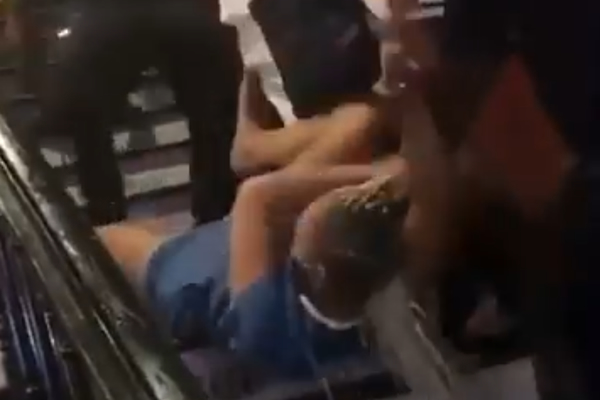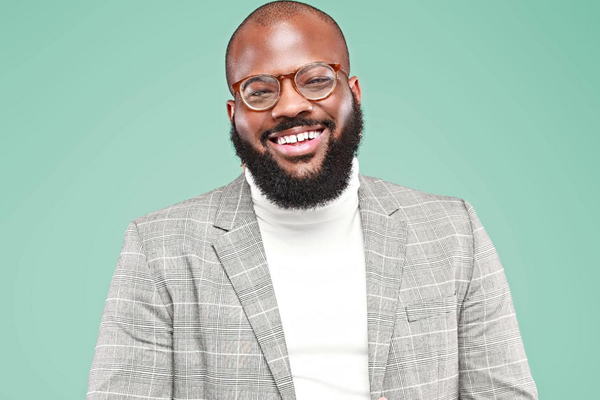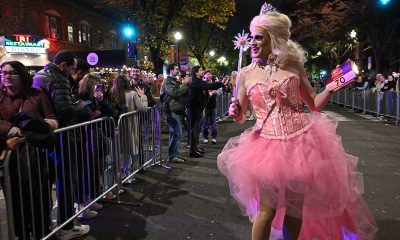Local
D.C. LGBTQ community reckons with anti-Blackness, gentrification after Nellie’s incident
Preston Mitchum among those calling for boycott of U Street bar

A video posted to Twitter earlier this month showed a member of Nellie’s Sports Bar’s security detail dragging Keisha Young, a 22-year-old Black woman, down the stairs by her hair after confusing her with a different customer who had reportedly tried to sneak liquor into the bar.
The video went viral, attracting massive online attention, including from Mayor Muriel Bowser and many others. A second video that appears to show an altercation between Young and other patrons seconds before security dragged her down the stairs has also emerged.
“Obviously, entrepreneurs enforce rules in their restaurants, but they’re not allowed to assault anybody,” Bowser told the Washington Post. “If that’s a matter for the Metropolitan Police Department, we’ll take it up.”
In a Facebook post that has since been deleted, Nellie’s responded to the surfacing of the video.
“We were incredibly upset and disturbed to see the unfortunate event that took place at Nellie’s last night,” referring to the June 12 incident. “We are undergoing a full investigation of the situation. At Nellie’s, we foster an inclusive and safe environment, so events like this are completely unacceptable to us.”
The statement garnered negative reactions online, forcing Nellie’s to issue a follow-up statement, part of which read, “We offer a heartfelt apology to all who witnessed the horrific events of the past weekend … Nellie’s will be closed this week as we evaluate this regrettable situation.”
Since Nellie’s closed and a protest in solidarity with Young was staged outside the bar on June 13, the queer community has been forced to reckon with what some describe as Nellie’s history of racist practices, as well as D.C.’s increasing gentrification.
Accusations of racism at Nellie’s are not new. Whitman-Walker Health in a June 15 tweet noted the incident that involved Young “is not the first time we have heard calls for respect for Black patrons of Nellie’s Sports Bar.” The Capital Pride Alliance in its statement about what happened to Young said Nellie’s response “will impact the CPA’s relationship with Nellie’s.”
“Over the years, the culture [at Nellie’s] became one that seemed hell-bent on pushing Black patrons out and making it a bar more for straight people and white gay men. In fact, [owner] Doug Schantz has gone on record calling his bar ‘straight-friendly’,” said Preston Mitchum, director of policy for Unite for Reproductive and Gender Equity (URGE) and a former avid Nellie’s patron.
Mitchum moved to D.C. in 2011 and started frequenting Nellie’s because of its reasonably priced drinks, which “sounded good” to him as a then-25-year-old professional.
On the alleged racial profiling at Nellie’s, Mitchum added, “I noticed that when more Black people went, particularly on Sundays, security increased. That always felt peculiar because Friday and Saturday nights were packed and had less security, based on observation. Staff also paid minimal attention to the interactions [between] white patrons. In short, there were many racist interactions and drunken behavior, and no one moved a muscle.”
Mitchum also claims that Black patrons were treated poorly compared to white customers in similar situations. He recalls incidents in which police officers were called on Black patrons and they were kicked out whereas many white patrons received warnings or “had fights broken up.”
Nellie’s in 2018 was embroiled in controversy over its display of a Blue Lives Matter flag on social media.
FOX 5 reported Nellie’s claimed to display the flag in support of LGBTQ officers who were “attending a meeting in a welcoming space.” However, many on social media were enraged by the display of the flag, which is viewed as opposing the Black Lives Matter movement, which hinges on advocating for victims of police brutality, and more importantly, reforming or abolishing the police and replacing it with community security efforts to reduce instances of racial profiling and Black deaths.
As a Black customer invested in making Nellie’s safer for him and the rest of the POC queer community, Mitchum said he participated in a number of measures to help change the culture at Nellie’s.
In a Facebook post published on his page, Mitchum wrote, “Myself and others have written letters, did interviews, conducted ‘sensitivity’ trainings, met with the owner, and even planted ourselves as observers to document our experiences.”
The efforts, however, were in vain, as according to Mitchum, Schantz did not take the efforts seriously.
For instance, Mitchum in June 2017 met with Schantz and his manager to discuss the issues at Nellie’s and to draft solutions moving forward. The meeting proved futile as Mitchum notes in a letter to Schantz, made public on social media, that among others things, asserts that Mitchum experienced rudeness from Schantz’s manager and that Schantz uttered statements with racist undertones.
“I have revisited our conversation many times and I’m still unsure of the purpose of your manager at our May 30 meeting. Not only did it create an attacking atmosphere of two-on-one, she was your ‘yes woman’ thus another person to shut down my opinion because it didn’t jive with both of yours,” penned Mitchum.
Mitchum added, “I hope you can genuinely realize that you equated hip-hop music (that uses “fuck” and the N-word) to violence … there is no valid statistical proof that creates a casual relationship between rap music and violence. Even as I pressed this fact, your response (as well as your manager’s) was ‘it’s his/my bar’ so you can play any music you like.”

Given the lack of change in culture at Nellie’s and the recent incident involving Young, Mitchum and others have called for a boycott of the bar.
A protest was staged outside Nellie’s on June 13.
The Georgetown Voice reports that Nee-Nee Taylor, co-conductor of Harriet’s Dreams (a Black-led community defense organization) said, “we ask the people to protest and boycott Nellie’s because the owner, who is a white man, don’t care about Black women.”
The Georgetown Voice also reports that Mitchum, who was present at the protest, “accused Nellie’s of relying on the business of Black patrons and gentrifying the local community while failing to care for its Black employees and patrons.”
As Mitchum reflects on how venues safe for Black LGBTQ people are disappearing, he mentions, “What was once ‘Chocolate City,’ we now see a city hovering around 50 percent Black. That’s intentional. I live a few blocks from U Street and anyone need not to be in the area to understand just how much the landscape has shifted.”
Regarding places to frequent now, Mitchum recommends Mr. Braxton’s Bar and Restaurant; Hook Hall; BIN 1301; and Fireplace.
The Washington Blade has reached out to Schantz for a response to Mitchum’s allegations but did not receive a response.
Michael K. Lavers contributed to this story.
District of Columbia
D.C. Black Pride theme, performers announced at ‘Speakeasy’
Durand Bernarr to headline 2026 programming

The Center for Black Equity held its 2026 DC Black Pride Theme Reveal event at Union Stage on Monday. The evening, a “Speakeasy Happy Hour,” was hosted by Anthony Oakes and featured performances by Lolita Leopard and Keith Angelo. The Center for Black Equity organizes DC Black Pride.
Kenya Hutton, Center for Black Equity president and CEO, spoke following the performances by Leopard and Angelo. Hutton announced this year’s theme for DC Black Pride: “New Black Renaissance.”
Performers for 2026 DC Black Pride were announced to be Bang Garcon, Be Steadwell, Jay Columbus, Bennu Byrd, Rue Pratt and Akeem Woods.
Singer-songwriter Durand Bernarr was announced as the headliner for the 2026 festivities. Bernerr gave brief remarks through a video played on the screen at the stage.
DC Black Pride is scheduled for May 22-25. For more information on DC Black Pride, visit dcblackpride.org.
Virginia
Arlington LGBTQ bar Freddie’s celebrates 25th anniversary
Owner asks public to support D.C.-area gay bars

An overflowing crowd turned out Sunday night, March 1, for the 25th anniversary celebration of Freddie’s Beach Bar, the LGBTQ bar and restaurant located in the Crystal City section of Arlington, Va.
The celebration began as longtime patrons sitting at tables and at the bar ordered drinks, snacks, and full meals as several of Freddie’s well-known drag queens performed on a decorated stage.
Roland Watkins, an official with Equality NoVa, an LGBTQ advocacy organization based in the Northern Virginia areas of Arlington, Alexandria, and Fairfax County, next told the gathering about the history of Freddie’s Beach Bar and the role he said that owner Freddie Lutz has played in broadening the bar’s role into a community gathering place.
“Twenty-five years ago, opening a gay bar in Arlington was not a given,” Watkins told the crowd from the stage. “It took courage, convincing, and a deep belief that our community belongs openly, visibly, and proudly,” he said. “And that belief came from Freddie.”
Watkins and others familiar with Freddie’s noted that under Lutz’s leadership and support from his staff, Freddie’s provided support and a gathering place for LGBTQ organizations and a place where Virginia elected officials, and candidates running for public office, came to express their support for the LGBTQ community.
“Over the past 25 years, Freddie’s has become more than a bar,” Watkins said. “It has become a community maker.”
Lutz, who spoke next, said he was moved by the outpouring of support from long-time customers. “Thank you all so much for coming tonight and thank you all so much for your support over the past 25 years,” he said. “I can’t tell you how much that means to me and how much it’s kept me going.”
But Lutz then said Freddie’s, like many other D.C. area gay bars, continues to face economic hard times that he said began during the COVID pandemic. He noted that fewer customers are coming to Freddie’s in recent years, with a significant drop in patronage for his once lucrative weekend buffet brunches.
“So, I don’t want to be the daddy downer on my 25-year anniversary,” he said. “But this was actually the worst year we’ve ever had,” he added. “And I guess what I’m asking is please help us out. Not just me, but all the gay bars in the area.” He added, “I’m reaching out and I’m appealing to you not to forget the gay bars.”
Lutz received loud, prolonged applause, with many customers hugging him as he walked off the stage.

In an official statement released at the reveal event Capital Pride Alliance described its just announced 2026 Pride theme of “Exist, Resist, Have the Audacity” as a “bold declaration affirming the presence, resilience, and courage of LGBTQ+ people around the world.”
The statement adds, “Grounded in the undeniable truth that our existence is not up for debate, this year’s theme calls on the community to live loudly and proudly, stand firm against injustice and erasure, and embody the collective strength that has always defined the LGBTQ+ community.”
In a reference to the impact of the hostile political climate, the statement says, “In a time when LGBTQ+ rights and history continue to face challenges, especially in our Nation’s Capital, where policy and public discourse shape the future of our country, together, we must ensure that our voices are visible, heard, and unapologetically centered.”
The statement also quotes Capital Pride Alliance CEO and President Ryan Bos’s message at the Reveal event: “This year’s theme is both a declaration and a demand,” Bos said. “Exist, Resist, Have Audacity! reflects the resilience of our community and our responsibility to protect the progress we’ve made. As we look toward our nation’s 250th anniversary, we affirm that LGBTQ+ people have always been and always will be part of the United States’s history, and we will continue shaping its future with strength and resolve,” he concluded.
-

 India5 days ago
India5 days agoActivists push for better counting of transgender Indians in 2026 Census
-

 Advice4 days ago
Advice4 days agoDry January has isolated me from my friends
-

 District of Columbia4 days ago
District of Columbia4 days agoCapital Pride reveals 2026 theme
-

 National4 days ago
National4 days agoAfter layoffs at Advocate, parent company acquires ‘Them’ from Conde Nast




















